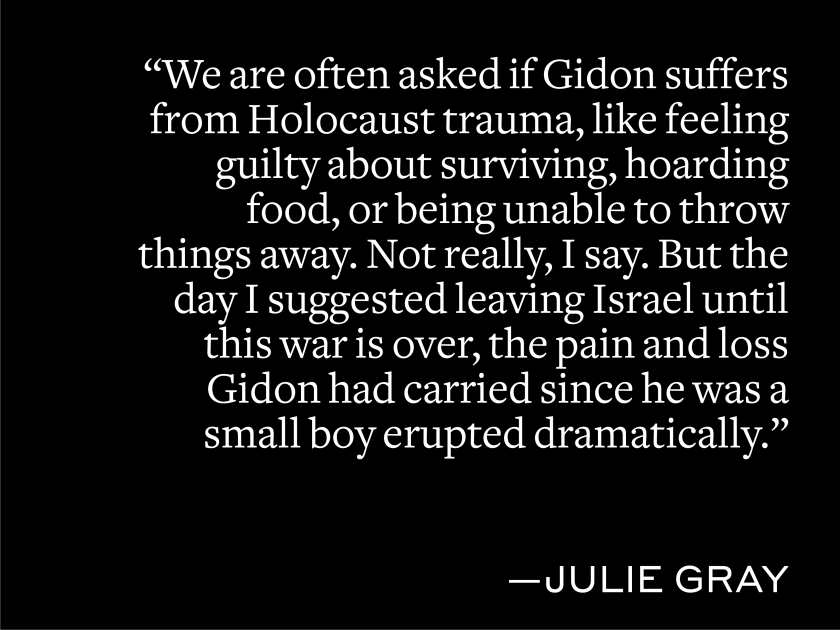
This piece is one of an ongoing series that we are sharing from Israeli authors and authors in Israel.
It is critical to understand history not just through the books that will be written later, but also through the first-hand testimonies and real-time accounting of events as they occur. At Jewish Book Council, we understand the value of these written testimonials and of sharing these individual experiences. It’s more important now than ever to give space to these voices and narratives.
In collaboration with the Jewish Book Council, JBI is recording writers’ first-hand accounts, as shared with and published by JBC, to increase the accessibility of these accounts for individuals who are blind, have low vision or are print disabled.
On Friday October 6, my life partner, Gidon Lev, and I were at Kibbutz Mishmar HaEmek in the Jezreel Valley of Israel to visit his son, grandchildren, and great-grandchildren. The Jezreel Valley is broad, green, and dotted with kibbutzim, Arab Israeli villages and towns, and miles and miles of golden fields. The call of the muezzin blends with songbirds, rustling leaves, and flowing springs. In the evening, we joined the kibbutz residents to celebrate Shabbat and Simchat Torah in the communal dining hall.
Hours later and ninety miles away, a nightmare of brutality was unfolding. Hamas terrorists proceeded to brutally murder over a thousand Israelis — children, mothers, fathers, those with disabilities, and the elderly. In some cases, these murders were live streamed. In others, videos of the murders were sent to the victim’s family from the victim’s own phone. Hundreds of young people dancing in the desert at a music festival were mowed down.
While these events were taking place, Gidon and I were unaware of them. We slept, and then later bathed in a fresh spring, joined by families from all over Northern Israel. A lovely Arab Israeli woman, Hamda, wearing a bathing suit that covered her head, laughingly stretched her arm out to me as I struggled near the churning waterfall. We spoke in Hebrew and Arabic, and she told me that she and her family were from Acre. I remember it as a lovely afternoon, were it not for people checking their phones nervously around us.
Something was happening, but it wasn’t clear what. Reports and more reports. Text messages and anguished faces of worry. Gidon and I raced back home to see what was happening. We spent our evening in our bomb shelter.
When the news caught up and began to report the stories of what had happened, Gidon and I were swallowed up whole and spat out again in shock. How could this happen? What would happen next? As the days passed, our phones pinged day and night with news updates, rocket alarms, and pleas for us to leave the country as soon as possible. Like everyone else in Israel and around the world, we tried to absorb the news, glued to the television. We saw and can never unsee the terrible footage of a young Israeli girl with bloodied hands, face, and crotch being taken through the streets of Gaza. Or that of another young woman being taken away on a motorcycle, beseeching her bound and helpless boyfriend to stop what was happening. We all saw the pictures of burnt corpses. Of babies.
Gidon will be eighty-nine years old in March. He spent four years of his childhood in the Theresienstadt concentration camp. His third son, Elisha, was called up for reserve duty on the Lebanese border. His grandson, Noi, was called up to serve on the Jordanian border. Obsessively, I check the rocket reports to see where and when missiles have been fired into Israel. Each new day is worse than the last – the fear, shock, and horror coursing through our veins. The media is a constant drumbeat of death, destruction, and blame.
We are often asked if Gidon suffers from Holocaust trauma, like feeling guilty about surviving, hoarding food, or being unable to throw things away. Not really, I say. But the day I suggested leaving Israel until this war is over, the pain and loss Gidon had carried since he was a small boy erupted dramatically. He came out of the shower and, clutching his towel to himself, roared at anyone and everyone – “I will not run! I will not lose my family! Not again!”
It wasn’t easy to convince Gidon to go to Kibbutz Ein Gedi, near the Dead Sea. It isn’t leaving the country, but it is leaving what I think of as “the bullseye” of Israel — Tel Aviv. Now, we are in the lowest place on earth. It is quiet here except for the desert birds darting among the rocks and children playing. There are hundreds of survivors here from Kibbutz Be’eri and Kibbutz Holit. Kibbutz Ein Gedi has embraced them.
This feels like a collective dark night of the soul. The world holds its breath. “Who knows what will be?” Gidon often says. All I know is this: seventy-eight years ago, when a malnourished, traumatized, ten-year-old Gidon stumbled back into freedom, he simply put one foot in front of the other, believing, somehow, that things could be better. And I am lucky to be at his side.
The views and opinions expressed above are those of the author, based on their observations and experiences.
Support the work of Jewish Book Council and become a member today.
California native Julie Gray made aliyah in 2012 and lives in Tel Aviv. Her writing can be found in the Jewish Journal, the NY Post, the Times of Israel, the Huffington Post, Moment Magazine, and others. Gidon and Julie’s book, Let’s Make Things Better (Hachette/Pan MacMillan) will be available Fall 2024.